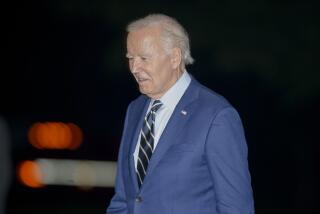Arafat and Netanyahu Light Up Mideast Talks
- Share via
EREZ CROSSING, Gaza Strip — Israeli Prime Minister Benjamin Netanyahu and Palestinian Authority President Yasser Arafat, two crusty leaders who have never made a secret of their mutual animosity, on Wednesday shared an elaborate lunch, passed around cigars and reached understanding on three confidence-building measures in their stalled peace process.
Secretary of State Madeleine Albright, the catalyst in the Israeli-Palestinian rapprochement, said: “I’m more than satisfied--in fact, pleasantly surprised.”
Netanyahu, Arafat and Albright confirmed that they will meet in a Camp David-style summit beginning Oct. 15. Officials said the meeting at Wye Plantation on the eastern shore of Maryland, is expected to last for several days and could run even longer if necessary.
All three sides said the summit was designed to complete negotiations on a series of troublesome land and security issues and, if all goes well, to start talks on a permanent settlement between Israel and the Palestinians.
While Wednesday’s session left unresolved the most contentious interim issues, U.S. officials said it represented a slight thawing in what had been a stone-cold impasse between Netanyahu and Arafat.
Albright and Netanyahu stressed at separate news conferences that an enormous amount of work remains to be done in the week before the summit. But officials pointed to the agreements the Israeli and Palestinian leaders did reach Wednesday: to open a long-delayed industrial park in the Palestinian-ruled Gaza Strip, establish a joint committee to discourage provocative actions, and start a people-to-people exchange program.
“We’ve climbed the foothills,” Netanyahu said of the agreements. “But we still have a very large mountain to scale in Washington.”
Palestinian officials were more subdued. Arriving in Cairo late Wednesday en route to Moscow, Arafat focused his comments on Albright, saying, “She has done a lot to push the peace process forward.”
Even as Albright was announcing the conclusion of Wednesday’s talks, one of Netanyahu’s Cabinet ministers was attending a ceremony laying the cornerstone of new Jewish construction in the tense West Bank city of Hebron. The Palestinians have demanded a halt to expanding Jewish settlements in West Bank territory as part of peace negotiations.
A senior U.S. official said Wednesday’s three agreements were reached during a meeting that began in a conference room on the Israeli side of the border and then continued during an impromptu lunch on the Palestinian side.
Albright said later that as the scheduled morning meeting was reaching its designated end, Netanyahu remarked that complex issues remained unresolved and suggested that sandwiches be brought in.
Albright said Arafat replied: “I was going to have lunch with Secretary Albright. Why don’t you join us?” As the lunch was coming to a close, she said, Netanyahu asked if he could have a cigar, and Arafat presented him with a box of them.
A U.S. official who attended the lunch said about 10 Israelis and Palestinians lighted up the stogies.
A senior Clinton administration official said that for the first time in almost two years, the Israeli and Palestinian leaders showed some sympathy for the needs, limitations and aspirations of each other. But, the official said, the atmosphere must be sustained if the sides are to settle their disputes.
In the first Israeli-Palestinian agreement since an accord was reached in January 1997 on the future of Hebron, Netanyahu and Arafat agreed to open the Gaza industrial park in December, a step that is expected to provide jobs for as many as 40,000 Palestinians in an area racked by unemployment.
Also approved was creation of the joint “anti-incitement” committee intended to discourage Palestinian newspapers and television stations from fomenting violence against Israel and to deter settlers and other Israelis from provocative actions. The leaders also agreed to begin exchanges between businesspeople, students, doctors and others.
Left undecided were far more serious issues such as the extent of Israel’s further ceding of West Bank land to the Palestinian Authority and the Israeli demand that the Palestinians take firm action against terrorism.
A senior official said, however, that cooperation between Israeli and Palestinian security forces has resumed after almost 18 months.
Albright said President Clinton will play an active role in next week’s summit, much as former President Jimmy Carter did at the Israeli-Egyptian Camp David conference two decades ago.
More to Read
Sign up for Essential California
The most important California stories and recommendations in your inbox every morning.
You may occasionally receive promotional content from the Los Angeles Times.













